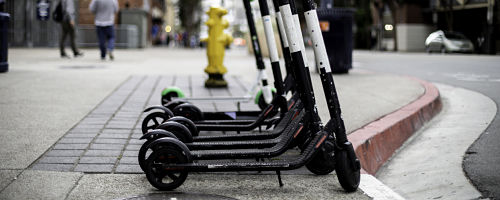Escooters – accident investigation
The number of Escooters on UK roads is increasing with several cities running trial rental schemes.
As the number of escooters increases so does the number of accidents and we are predicting a surge in the number of personal injury cases as a result.
There were 484 reported casualties in accidents involving e-scooters in 2020. More than half of the casualties were between 39 and 50 and the majority were male.
CLASSIFICATION
We also have concerns about the way accident investigators examine incidents involving scooters.
Escooters are not classed as motor vehicles. If involved in an incident those involved describe them in a special category known as ‘other vehicle’.
The Gov.UK website explains what this means: “E-scooters” are not one of the designated vehicle types collected in a STATS19 reportable accident, as such they would be classed as other vehicle and can only be identified using a free text field.
“The “Other vehicle” category was introduced in 2011 to replace the previously collected vehicle types, other motor vehicle and other non-motor vehicle. A free text field was introduced at the same time to provide insight into what other vehicles were being recorded.
“The free text field is not validated as designated vehicle type data, and therefore not as robust as published vehicle statistics. Therefore, using this text does require some investigation and validation. Unfortunately, the word scooter is not exclusive to one type of vehicle and depending on the context used, it could be used to describe a variety of vehicles including some motorcycles (those that have a step-through frame and a platform for the rider’s feet to rest on), mobility scooters and traditional stand on scooters. Stand on scooters can also have different methods of propulsion (petrol, electric or physical effort). Guidance has been issued to all forces to ensure they capture more than just the word ‘scooter’ in the free text description when recording this.”
Going forward the government plans to class escooters under the category – ‘powered personal transporter’. This is a new category that the government is introducing as part of recent recommendations.
ACCIDENT INVESTIGATION
TRL: The Future of Transport is about to embark on a research project which could help investigators working on cases involving escooters.
TRL said: “At present there is a wealth of data available relating to pedestrians and cyclists to use in reconstruction reports, such as expected speeds, accelerations and decelerations, operator kinematics and injuries. Similar datasets do not yet exist for e-scooter users.
“We are therefore about to start work on a research project studying the mechanics and capabilities of e-scooters, and the biomechanics of users when they conflict with vehicles or pedestrians. Our aim is to create a scientifically robust pool of reference data, that can be used to inform our investigations into these types of collisions.”
As with any accident we recommend you follow these steps immediately after an incident:
- Administer first aid
- Report your injuries
- Document your injuries in writing
- Take photographs
- Get witness details
- Get medical evidence
- Record expenses
- Record financial losses
- Contact a solicitor
For more information on recording accident information, read our BLOG
NV Legal
If any of these issues affect you our solicitors can provide free legal advice. NV Legal has a specialist team of solicitors experienced in dealing with escooter incidents. If you or someone you know has sustained an injury, contact us for advice.
Consultations are FREE of charge. Advice is from qualified solicitors, regulated by the Solicitors Regulation Authority.
Call – 03330 112732
Email – info@nvlegal.co.uk
Website – www.nvlegal.co.uk
Find us on social media – Facebook Twitter LinkedIn
USEFUL LINKS


